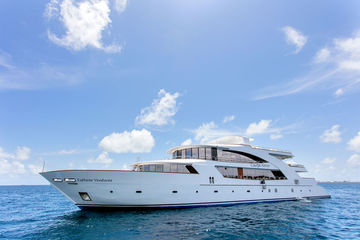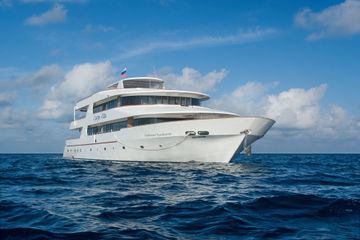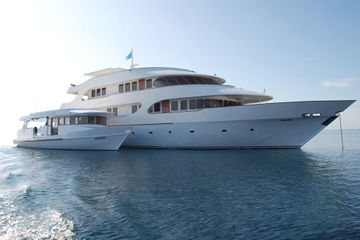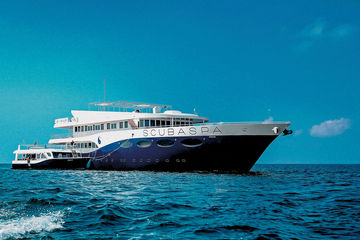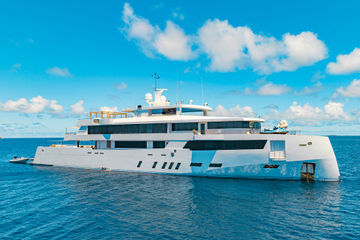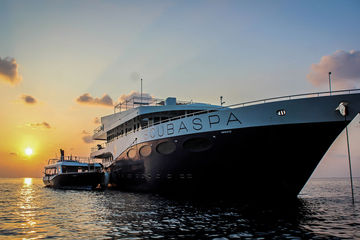Popular Raa Atoll liveaboards Explore all liveaboards
Liveaboard Diving in Raa Atoll
What To Expect On A Raa Atoll Liveaboard
Liveaboards to Raa Atoll in the Northern Atolls of the Maldives, are known for having an immense volume of fish with a staggering variety of different species. Like its sister atoll Baa, it opened to divers later than the Central Atolls, and the area still remains relatively un-crowded today. Raa is located north of Baa, separated only by a thin channel and lies along the western edge of the Maldives. Within its 60 kilometer length, Raa boasts over 90 islands, around 16 of which are inhabited. There is a good choice of Maldives liveaboard vessels that operate itineraries which include Raa Atoll.
Raa Atoll Underwater
Maldives liveaboard diving in Raa Atoll mainly centers on Raa's pinnacles, or thilas, though dive cruises sometimes visit a kandu or two as well. Open-ocean animals like tuna frequent Raa's fish-loaded thilas for mealtimes, so divers get to see both reef fish and pelagics, often in an exciting drama of predator versus prey. Raa thilas exhibit the Northern Atolls' characteristic topography of overhangs and caverns. The color on the reefs comes from vibrant, swaying soft corals, though a couple sites in Raa have nice hard coral, a rarer sight in the Northern Atolls.
Dive Sites Of Raa Atoll
Fenfushi Giri, a shallow pinnacle which sometimes breaks the surface, offers overhangs, a wall, and reef slopes with multitudes of reef fish and hunting tuna. The wall is decorated with colorful black coral bushes (black coral is only black on the inside, for the outer color is often yellow or cream), while the slope enjoys some good hard coral cover. Check for reef fish in the overhangs, from squirrelfish to Napoleon wrasse, and look for mantis shrimp where the hard coral cover gets slim.
Reethi Thila also offers loads of fish, and species diversity at this site is often reputed to be spectacular. While Reethi lacks Fenfushi's hard corals, it similarly features overhangs in which to search for fascinating marine life. However, most of the marine life displays itself willingly, with species after species of reef fish flitting about the reef, from butterflyfish, to wrasses, to snappers, to unicornfish, to triggerfish and the list goes on.
Bathalaa Kandu is one of the most colorful channels in the Northern Atolls; the walls of this underwater canyon are covered in pink soft corals. Black coral bushes on the reef slope add to the color palette, as well as big sponges, gorgonian fans, and some hard corals. Beriyan Kuda Thila is also a sites frequented by Raa dive dhonis, where a mixture of overhangs, reef fish, and pelagic hunters like jacks makes for a lively dive.
Top Tips For Divers
In the Maldives, a Green Tax of 6 USD per person per night applies for every tourist in the country. The official language is Maldivian, also called Dhivehi.
Gear to bring includes your own mask, booties, fins, and dive computer. These are personalized pieces of equipment which we don't recommend renting. An ill-fitting mask or pair of fins can make diving virtually impossible, and a dive computer is your most-important piece of safety equipment.
Getting To Raa Atoll
Like anywhere in the Maldives, Raa Atoll is best dived by liveaboard; in no other way can you access so many dive sites, often near uninhabited islands or far from land. The length of liveaboard itineraries that include Raa Atoll is usually 10 or 11 nights, with a budget of around 350 euros per night. Liveaboards often combine Raa Atoll with Baa, Noonu, Lhaviyani, and potentially the Far Northern Atolls. Sometimes, itineraries also add in the Central Atolls.
Male is one of the Maldives liveaboard departure locations for Raa Atoll liveaboards, accessible by direct flights from Dubai, Singapore, and Colombo. On liveaboards combining Raa with the Far Northern Atolls, however, Hanimadhoo or Dharavandhoo may be the port of departure. These destinations can be reached by domestic sea plane from Male. To get to Male from Europe, America, China, India, and Australia, flights often connect through the nearer airports mentioned above.
Diving Raa Atoll is possible all year round, but the northeast monsoon from January to May allows the calmest surface conditions. The water temperature usually stays between 27 and 30 C, and visibility between 10 and 20 meters.
Raa Atoll Diving Reviews
- 9.5 Exceptional
- 5 Verified Reviews
Unfortunately not the greatest visibility, but a lot of that is due to the time of year.
Diving Raa Atoll in September on the Scubaspa Ying
Did not go to Raa, instead we went to Lhavidya for 1 dive, and then to North Male. Those were great as well, and similar to the Baa Atoll experience (as in, very diverse). The Hulhumale Faru dive (just off the main Male Harbor) was also great in the morning (after the fishermen dump the remnants of cleaning their catch) — tens (if not more) of stingrays, and a handful of sharks (spinner, lemon, maybe a blacktip).
Diving Raa Atoll in October on the Princess Haseena
I think we spotted the whale sharks here
Diving Raa Atoll in October on the Carpe Novo
nice corals, mainly smaller marine life
Diving Raa Atoll in April on the Carpe Diem
Great, untouched Reefs, schooling fishes, Sharks and Macro as well
Diving Raa Atoll in September on the Carpe Novo
